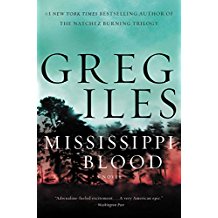Greg Iles is known to readers everywhere. His first novel. Spandau Phoenix, was published in 1993 and became a bestseller. He has since had many chart-toppers. In his fourth novel, The Quiet Game, he created Penn Cage and placed him in Natchez, the oldest city on the M
ississippi River.
He has written the Natchez Burning Trilogy featuring Penn Cage. The first two novels are Natchez Burning and The Bone Tree.
Mississippi Blood is the last volume in the trilogy. In it, we find mayor and former prosecutor, Penn Cage who is shattered by grief at the loss of his fiancée Caitlin Masters. In addition, his father, Dr. Tom Cage, is about to be tried for murder. Dr. Cage’s trial sets an ominous clock in motion, and unless Penn can lift the veil of the past and help exonerate his father, his family will be destroyed.
Mississippi Blood features a mesmerizing murder trial at the heart of the novel. How did you learn so much about courtroom procedures and tactics?
I’m not an attorney and don’t have any formal knowledge of courtroom procedures. I’ve attended a few murder trials but most of what I learned about trial tactics and routines can be attributed to my attorney-buddy who read the first draft and made many corrections. My guides for writing convincing trial scenes came from my having read Robert Traver’s Anatomy of a Murder and Scott Turow’s Presumed Innocent. Those books gave me plenty of information.
As you know, an actual trial is a drama acted out in real life.
For a novelist writing a trial scene, the trick is to eliminate all the tedious elements found in an actual trial, while retaining the very essence of “conflict” which is at the crux of every trial. That conflict of competing narratives between prosecution and defense is the dramatic force, whether in an actual courtroom trial or one within the pages of a book.
If your narrative is convincing, your trial tactics will work, whether to a jury or to the readers of your novel.
Penn Cage is a fascinating character. How has he evolved over the course of the trilogy?
It was never my intention for Penn to be a series’ character. I thought his story would be explored in a standalone novel, but as I returned to Mississippi more and more in my fiction, Penn evolved from being an observer to an actor in the drama of the novels. His evolution involved his becoming more and more morally challenged with each book, which forced him to compromise with his own values as he went forward. As with us all, the more we see of life and surmount challenges, we must make certain compromises.
When writing the Natchez Burning Trilogy, how did you handle giving enough backstory in each successive novel without repeating too much of the contents of the earlier books?
It’s a temptation to make the worst mistake possible by providing exposition for the reader who came late to the trilogy. I had to trust that a new reader could be dropped into this story in medias res, and I felt the power of the story would clutch the reader through to the end. I avoided giving too much backstory beyond just using a few compressing devices early in the book—a newspaper summary—which I felt would suffice. I had to trust the story would carry itself.
I understand in 2011, you sustained life-threatening injuries in an automobile accident, and found new motivation by re-entering the world of Penn Cage, the realm of Natchez, and the secrets of the town. Will you tell us a bit about that?
I was driving when a car going seventy miles an hour, hit my driver’s side door. I sustained a torn aorta, many broken bones, and lost half my right leg. I was in a medically-induced coma for a week. When I came out of that situation missing a leg, my entire attitude toward writing changed. I realized I’d been compromising with myself.
What I mean is this: I originally conceived of the Natchez Burning story as one book, which I was on the verge of completing when the accident occurred. But I had been shortchanging myself because I couldn’t properly address important issues such as race, family, and the South in a single novel.
When I came out of that coma, I realized I didn’t care how long the story had to be. I no longer cared who would get angry at me; and I told myself if I was going to be a Southern writer, I had to be unflinching in my commitment to the truth. It didn’t matter what the consequences might be.
The accident altered my life. I undertook a quest to write what I felt I needed to write. I decided to write a trilogy instead of writing this story in one book. I lost my publisher and changed agents. I had no idea how it would turn out. There are very few trilogies in mainstream trade publishing. Generally, it’s considered commercial suicide. The accident took me from being perceived as a thriller writer to being seen as a fiction writer dealing with very serious issues. And I’m gratified to have made that transition.
Speaking of Southern writers, your writing has been compared to that of Pat Conroy, Thomas Wolfe, and William Faulkner. How would you describe your style?
I would not compare myself with those writers. Like so many of us, I was inspired by them. I was fortunate enough to meet Pat Conroy a year before he died. I also got to meet William Styron and James Dickey.
I recall something Faulkner said: We look at our heroes and on the deepest level, we’re trying to be them. I would never presume to compare myself with those writers. But, I look at the place and time when they were writing and the subjects they chose, and I jumped into the water in my time. I feel I’ve got to do the best I can. What separates me from them is I’m a commercial novelist. I have to make a living. Even though I write what I want to, I still have to sell enough books so the publishing industry will pay me. That’s a difficult compromise to make. Throughout my career, I have had to make that compromise to a greater or lesser degree. With this trilogy, I’ve compromised to the least degree possible. The writers you mentioned were commercial novelists, but while writing, they threw commercial interests to the wind, much more than I can.
We both know this as writers: when writing a novel, we’re looking for resonance. I feel resonance is achieved by providing the reader with emotional insight that’s only gained through suffering. In a good commercial novel, we find two or three such insights in the book. What separates a good commercial novelist from a Faulkner or Tolstoy is this: those great novels have profound insights on almost every page or chapter. They distill the human condition in ways most commercial novels never can.
I understand Sony Pictures is developing a cable television series based on the Natchez Burning Trilogy. Tell us about that.
It’s in development right now, but these things take a very long time. So, I’m just waiting to see what happens.
What do you love about the writing life?
I’ll tell you something I learned as a musician and it applies to being a writer, as well: no matter how much you love something, when you begin doing it for a living, it changes things. In a way, the thing you love doing the most is inevitably compromised.
What do I love about the writing life? I love the freedom of it. If you’re fortunate enough to make a living from writing, you probably have more freedom than in almost any other career. When you get over that initial hump of attaining success, you have a great deal of freedom. You’re on your own. That’s what I love.
You’re having a dinner party and can invite any five guests, living or dead, from any walk of life. Who would they be?
That’s a great question. I really have to think about it. [Reflection for a while] I’d love to invite Carl Jung along with Robert Oppenheimer to hear them discuss science and psychology. It would be fascinating to have Friedrich Nietzsche there, along with the great Greek playwright, Euripides. They could add a great deal of insight about what it means to be human. And I think Marie Curie would add to the mix. Can you imagine the conversation these five people would have?
Congratulations on penning Mississippi Blood. It’s an atmospheric, beautifully crafted conclusion to a trilogy exploring racism, abuse of power, and the meaning of justice. It blends imagination, suspense, history and lyrical writing in a novel that I could not put down until I’d read the very last page.






Leave a Reply
You must be logged in to post a comment.